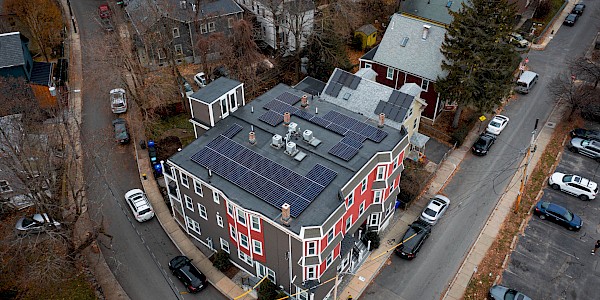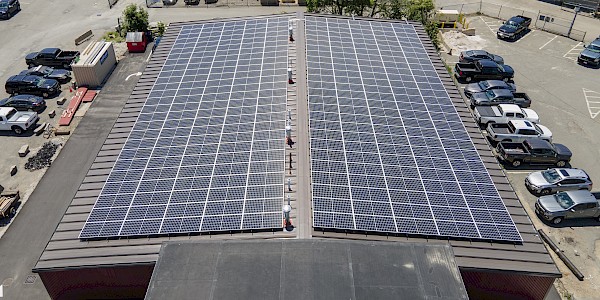The Federal Solar Tax Credit Has Been Extended!
Jan. 15, 2021
Many of us all over the globe are looking forward to renewing commitments we made at the end of 2019 and maybe putting an end to the things we weren’t so fond of in 2020. And while 2020 has been a year of disappointments for a lot of us, one good thing has come of it: the federal solar tax credit is here to stay a little bit longer!
Originally set to expire at the end of 2021 for residential solar installations, the federal solar tax credit was just extended and will now remain at 26% through the end of 2022 before dropping down to 22% in 2023 and expiring for homeowners in 2024. This extension gives homeowners a great opportunity to save big on solar!
If you are planning your own commitment and investment in renewable solar energy for your home, here is what you need to know about setting up your home (and your wallet) for successful and lasting solar panel installation.
The End of the Federal Solar Tax Credit Won’t Come Until 2024
With the extension of the federal solar tax credit, homeowners that invest in solar installation in 2021 and 2022 can reduce their federal taxes by 26% of their total solar installation costs.
For example, if your solar energy system costs $30,000, your 26% solar tax credit savings would equal $7,800, which you can then put towards what you owe in federal taxes! To be eligible, your solar energy system needs to be installed and placed in service (turned on) before the end of 2022, and you must own your solar panels.
You can read more about how the solar tax credit works here.
At present, this tax incentive is scheduled to drop down to 22% for residential solar PV systems after December 31st, 2022, and expire completely in 2024. For commercial solar PV systems, the incentive will be reduced and remain at a 10% benefit from 2024 onwards.
If you want to guarantee maximum savings from tax credit incentives, don’t wait to schedule your free solar quote—get started on your solar installation to start your savings now!
Beyond 2023 - A Future of the ITC?
This tax benefit, formally called the Federal Investment Tax Credit (ITC), was first enacted in 2006 and extended back in 2015 to incentivize renewable energy investments. It has since been extended again in December 2020, giving us even more hope for the future of the ITC.
With a new executive administration, it’s possible that there could be another tax extension beyond 2023 to the solar tax credit—but when it comes to government policy we have learned that there are no guarantees!
Other Financial Incentives for Solar
While the ITC extension allows for significant solar savings on the federal level, the state of Massachusetts has additional incentives for solar you can also take advantage of. In fact, the Solar Energy Industries Association ranks Massachusetts 8th in the country for solar energy systems, which is up from a ranking of 13 back in 2019!
Here are some of the financial incentives on the state level that can also reduce your net solar installation costs:
Massachusetts State Solar Tax Benefits
-
Solar installation is exempt from state sales tax (a savings of 6.25%)
-
Take an additional 15% of your total installation costs (up to $1,000) off your state tax liability with the Massachusetts solar panel tax credit
-
There is also a property tax exemption for the increase in home value from your solar installation, saving an average estimated $18,287.68 in property tax savings over 20 years
Learn more about Massachusetts state tax benefits here.
There are also non-tax related solar incentives and programs you can take advantage of to offset supplemental energy costs, and even generate income from your solar production, such as:
Massachusetts State Solar Incentives and Programs
-
SMART program to receive monthly utility payments for your solar energy production for 10 years. Value of rate is first-come, first-served so it pays to install as soon as possible!
-
Net Metering to offset your electricity bills from excess solar energy produced that is sent back to the electricity grid.
-
ConnectedSolutions program for National Grid customers to reward homeowners who use their solar battery storage systems to reduce grid demand at times of high energy usage, like in the early evenings.
Don’t Wait to Schedule Your Solar Installation
So now you know how to save on solar installation in 2021 — but finances aren’t the only consideration when it comes to solar. You may want to know how long it takes to install solar and learn about other home upgrades that you can invest in now to make your solar installation that much more successful over its 25+ year lifetime.
How long does solar installation take?
There are 5 basic stages of solar installation here at Boston Solar, which can add up to a total installation process that takes between an estimated 90 to 120 days to complete. This will vary greatly based on the details of your customized solar design and your town’s permitting process.
If you’re considering combining solar with solar battery storage or if you want to make some energy-efficient upgrades to your home before adding solar, start thinking about the solar process early in 2021 and get in touch with the #1 residential solar installer based in Massachusetts to talk through your energy needs with a free solar quote.
Claim your 26% federal solar tax credit in 2021! Get a free solar quote from Boston Solar by calling 617-858-1645 or schedule your appointment here.




